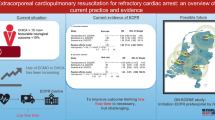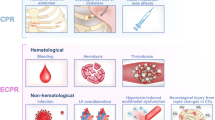Abstract
Sudden cardiac death is one of the leading causes of mortality across the Western world. Even in Europe, over 250,000 patients are affected by out-of-hospital cardiac arrest (OHCA) every year. Only 40% of patients received advanced Cardiopulmonary resuscitation (CPR) from experts and the survival of patients without neurological disability remained extremely low. Reduced no-flow time and low-flow time are the deciding factors that could improve outcomes for the patients with in-hospital cardiac arrest (IHCA) compared to OHCA. Veno-arterial extracorporeal membrane oxygenation (vaECMO) is a method to improve the survival of cardiac arrest patients. Extracorporeal cardiopulmonary resuscitation (eCPR) means the application of extracorporeal membrane oxygenation (ECMO) in patients where conventional CPR was unsuccessful in obtaining adequate return of spontaneous circulation (ROSC). The main objective of eCPR is to restore circulation and gas exchange for organ perfusion, and it allows for the time to be taken to prepare the patient for other major interventions, such as PCI. If eCPR could be initiated within the first hour after cardiac arrest, the outcomes could be significantly better. A list of inclusion and exclusion criteria is strictly to be considered as a relative criteria. The individual condition of the patient and the specific environmental factors have to be taken into account in order to make an appropriate decision of starting eCPR. Timing in eCPR is a crucial factor, which has been shown to have a massive impact on the outcomes of patients following cardiac arrest. Extracorporeal CPR might be most beneficial for patients who initially present with a shockable rhythm. The arterial pH as a surrogate for tissue damage due to prolonged anoxia before extracorporeal life support (ECLS) initiation is another important aspect. A pH below approximately 7.15 can be considered a specific and sensitive factor in predicting hospital mortality. Extracorporeal CPR is a resource-intensive therapy requiring specialized equipment and highly trained multidisciplinary experts. The implementation of prehospital ECLS performed by a trained team could significantly reduce the mean duration from advanced conventional cardiovascular life support to ECLS. Targeting CPR, which provides ECLS under permanent monitoring and consideration of special target values, maybe a promising approach in the future.
Since human organs for transplantations are rare and urgently needed, ECLS should not only be considered as a way to improve survival of patients but also in order to optimize potential for organ donation in patients with no chance of survival.
Access this chapter
Tax calculation will be finalised at checkout
Purchases are for personal use only
Similar content being viewed by others
Abbreviations
- AHA :
-
American Heart Association
- cCPR:
-
conventional cardiopulmonary resuscitation
- CPR:
-
cardiopulmonary resuscitation
- ECLS:
-
extracorporeal life support
- ECMO :
-
extracorporeal membrane oxygenation
- eCPR:
-
extracorporeal cardiopulmonary resuscitation
- ELSO :
-
Extracorporeal Life Support Organization
- EMS:
-
emergency medical services
- ERC:
-
European Resuscitation Council
- ETCO2:
-
expiratory carbon dioxide
- IHCA:
-
in-hospital cardiac arrest
- LVAD :
-
left ventricle assist device
- OHCA:
-
out-of-hospital cardiac arrest
- PCI :
-
percutaneous coronary intervention
- PEA :
-
pulseless electric activity
- pVT :
-
pulseless ventricular tachycardia
- ROSC :
-
return of spontaneous circulation
- tCPR:
-
targeted cardiopulmonary resuscitation
- vaECMO :
-
veno-arterial extracorporeal membrane oxygenation
- VF :
-
ventricular fibrillation
References
Kumar KM. ECPR-extracorporeal cardiopulmonary resuscitation. Indian. J Thorac Cardiovasc Surg. 2021;37:1–9.
Atwood C, Eisenberg MS, Herlitz J, Rea TD. Incidence of EMS-treated out-of-hospital cardiac arrest in Europe. Resuscitation. 2005;67(1):75–80.
Ohlemacher F, Lichy G. Advanced resuscitation measures: extracorporeal cardiopulmonary resuscitation. Anasthesiol Intensivmed Notfallmed Schmerzther. 2020;55(10):588–602.
Bougouin W, Dumas F, Lamhaut L, Marijon E, Carli P, Combes A, et al. Extracorporeal cardiopulmonary resuscitation in out-of-hospital cardiac arrest: a registry study. Eur Heart J. 2020;41(21):1961–71.
Ahn C, Kim W, Cho Y, Choi KS, Jang BH, Lim TH. Efficacy of extracorporeal cardiopulmonary resuscitation compared to conventional cardiopulmonary resuscitation for adult cardiac arrest patients: a systematic review and meta-analysis. Sci Rep. 2016;6:34208.
Daubin C, Brunet J, Huet J, Valette X, Charbronnier C, Sabatier R, et al. Extracorporeal Cardiopulmonary Resuscitation and survival after refractory cardiac arrest: is ECPR beneficial? ASAIO J. 2021;2(1):e12380.
Richardson ASC, Tonna JE, Nanjayya V, Nixon P, Abrams DC, Raman L, et al. Extracorporeal cardiopulmonary resuscitation in adults. Interim guideline consensus statement from the extracorporeal life support organization. ASAIO J. 2021;67(3):221–8.
Chen YS, Lin JW, Yu HY, Ko WJ, Jerng JS, Chang WT, et al. Cardiopulmonary resuscitation with assisted extracorporeal life-support versus conventional cardiopulmonary resuscitation in adults with in-hospital cardiac arrest: an observational study and propensity analysis. Lancet. 2008;372(9638):554–61.
Richardson AS, Schmidt M, Bailey M, Pellegrino VA, Rycus PT, Pilcher DV. ECMO cardio-pulmonary resuscitation (ECPR), trends in survival from an international multicentre cohort study over 12-years. Resuscitation. 2017;112:34–40.
Hsu CH, Meurer WJ, Domeier R, Fowler J, Whitmore SP, Bassin BS, et al. Extracorporeal cardiopulmonary resuscitation for refractory out-of-hospital cardiac arrest (EROCA): results of a randomized feasibility trial of expedited out-of-hospital transport. Ann Emerg Med. 2021;78(1):92–101.
Ortega-Deballon I, Hornby L, Shemie SD, Bhanji F, Guadagno E. Extracorporeal resuscitation for refractory out-of-hospital cardiac arrest in adults: a systematic review of international practices and outcomes. Resuscitation. 2016;101:12–20.
Panchal AR, Berg KM, Hirsch KG, Kudenchuk PJ, Del Rios M, Cabanas JG, et al. 2019 American Heart Association focused update on advanced cardiovascular life support: use of advanced airways, vasopressors, and extracorporeal cardiopulmonary resuscitation during cardiac arrest: an update to the American Heart Association guidelines for cardiopulmonary resuscitation and emergency cardiovascular care. Circulation. 2019;140(24):e881–e94.
Lott C, Truhlar A, Alfonzo A, Barelli A, Gonzalez-Salvado V, Hinkelbein J, et al. European resuscitation council guidelines 2021: cardiac arrest in special circumstances. Resuscitation. 2021;161:152–219.
Nolan JP, Soar J, Cariou A, Cronberg T, Moulaert VR, Deakin CD, et al. European resuscitation council and European Society of Intensive Care Medicine 2015 guidelines for post-resuscitation care. Intensive Care Med. 2015;41(12):2039–56.
Soar J, Maconochie I, Wyckoff MH, Olasveengen TM, Singletary EM, Greif R, et al. 2019 international consensus on cardiopulmonary resuscitation and emergency cardiovascular care science with treatment recommendations: summary from the basic life support; advanced life support; pediatric life support; neonatal life support; education, implementation, and teams; and first aid task forces. Circulation. 2019;140(24):e826–e80.
Spangenberg T, Meincke F, Brooks S, Frerker C, Kreidel F, Thielsen T, et al. “Shock and go?” extracorporeal cardio-pulmonary resuscitation in the golden-hour of ROSC. Catheter Cardiovasc Interv. 2016;88(5):691–6.
Sip M, Puslecki M, Dabrowski M, Klosiewicz T, Ligowski M, Stefaniak S, et al. Implementation of extended cardiopulmonary resuscitation procedure in in-hospital cardiac arrest — a preliminary simulated study. Disaster Emerg Med J. 2021;6(1):10.
Wengenmayer T, Rombach S, Ramshorn F, Biever P, Bode C, Duerschmied D, et al. Influence of low-flow time on survival after extracorporeal cardiopulmonary resuscitation (eCPR). Crit Care. 2017;21(1):157.
Michels G, Wengenmayer T, Hagl C, Dohmen C, Böttiger BW, Bauersachs J, et al. Recommendations for extracorporeal cardiopulmonary resuscitation (eCPR): consensus statement of DGIIN, DGK, DGTHG, DGfK, DGNI, DGAI, DIVI and GRC. Clin Res Cardiol. 2019;108(5):455–64.
Cheskes S, Byers A, Zhan C, Verbeek PR, Ko D, Drennan IR, et al. CPR quality during out-of-hospital cardiac arrest transport. Resuscitation. 2017;114:34–9.
Fagnoul D, Combes A, De Backer D. Extracorporeal cardiopulmonary resuscitation. Curr Opin Crit Care. 2014;20(3):259–65.
Bartos JA, Frascone RJ, Conterato M, Wesley K, Lick C, Sipprell K, et al. The Minnesota mobile extracorporeal cardiopulmonary resuscitation consortium for treatment of out-of-hospital refractory ventricular fibrillation: program description, performance, and outcomes. EClinical Med. 2020;29-30:100632.
Abrams D, Garan AR, Abdelbary A, Bacchetta M, Bartlett RH, Beck J, et al. Position paper for the organization of ECMO programs for cardiac failure in adults. Intensive Care Med. 2018;44(6):717–29.
Trummer G, Benk C, Beyersdorf F. Controlled automated reperfusion of the whole body after cardiac arrest. J Thorac Dis. 2019;11(Suppl 10):S1464–S70.
Eurotransplant International Foundation 2021 [updated 25.09.2021. Available from: https://www.eurotransplant.org/wp-content/uploads/2021/01/Factsheet_2020.pdf.
Bougouin W, Cariou A, Jouven X. Extracorporeal cardiopulmonary resuscitation in out-of-hospital cardiac arrest: do not neglect potential for organ donation! Eur Heart J. 2020;41(37):3588.
Jabre P, Bougouin W, Dumas F, Carli P, Antoine C, Jacob L, et al. Early identification of patients with out-of-hospital cardiac arrest with no chance of survival and consideration for organ donation. Ann Intern Med. 2016;165(11):770–8.
Author information
Authors and Affiliations
Corresponding author
Editor information
Editors and Affiliations
Rights and permissions
Copyright information
© 2023 The Author(s), under exclusive license to Springer Nature Switzerland AG
About this chapter
Cite this chapter
Dusse, F., Torabi, S., Münke, N. (2023). Ins and Outs of Extracorporeal Cardiopulmonary Resuscitation (eCPR) service. In: Sabashnikov, A., Wahlers, T. (eds) ECMO Retrieval Program Foundation. Springer, Cham. https://doi.org/10.1007/978-3-031-20260-5_26
Download citation
DOI: https://doi.org/10.1007/978-3-031-20260-5_26
Published:
Publisher Name: Springer, Cham
Print ISBN: 978-3-031-17148-2
Online ISBN: 978-3-031-20260-5
eBook Packages: MedicineMedicine (R0)




